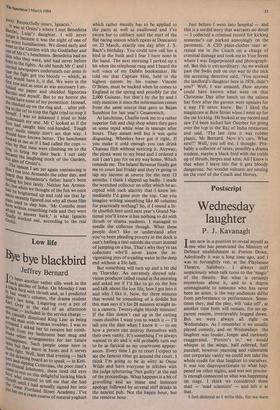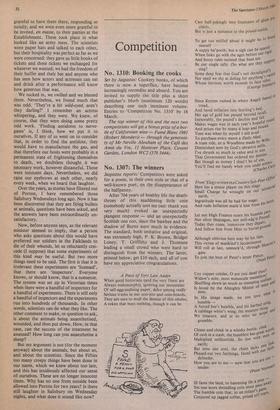Postscript
Wednesday laughter
P. J. Kavanagh
T am now in a position to reveal myself as 1 one who has penetrated the Ministry of Defence establishment at Porton Down. Admittedly it was a long time ago, and I was in fortnightly rep. at the Playhouse Theatre, Salisbury. I always sniff suspiciously when talk turns to the 'magic' of the theatre. But what is certainly mysterious about it, and to a degree unimaginable to someone who has never been an actor, is the way audiences differ from performance to performance. Some- times they, and the play, will 'take off', at another time both will remain, for no ap- parent reason, irretrievably bogged down. But we were always all right on Wednesdays. As I remember it we usually played comedy, and on Wednesdays the laughter was louder, longer and curiously exaggerated. 'Porton's in,' we would whisper in the wings, half relieved, half puzzled; however yearning and vulnerable our corporate vanity we could not take the whole credit for that laughter to ourselves. It was too disproportionate to what hap- pened on other nights, and was not precise- ly enough connected to what was happening on stage. I think we considered them mad — 'mad scientists' — and left it at that.
I feel disloyal as I write this, for we were grateful to have them there, responding so noisily; and we were even more grateful to be invited, en masse, to their parties at the Establishment. These took place in what looked like an army mess. The scientists wore paper hats and talked to each other, but their hospitality was perfect as far as we were concerned: they gave us little books of tickets and these tickets we exchanged for whatever we wanted; we had the freedom of their buffet and their bar and anyone who has seen how actors and actresses can eat and drink after a performance will know how generous that was.
We tucked in, we swilled and we blessed them. Nevertheless, we found much that was odd. 'They're a bit wild-eyed, aren't they darling?' I remember an actress whispering, and they were. We knew, of course, that they were doing some pretty odd work. 'Finding antidotes to nerve- gases' is, I think, how we put it to ourselves. If any of us went on to consider that, in order to find the antidote, they would have to manufacture the gas, and that therefore our hosts were probably in a permanent state of frightening themselves to death, we doubtless thought it was necessary work, however distasteful. Those were innocent days. Nevertheless, we did raise our eyebrows at each other, nearly every week, when we heard that laughter.
Over the years, as stories have filtered out of Porton, I have remembered those Salisbury Wednesdays long ago. Now it has been discovered that they are firing bullets at animals, questions have been asked, and the answers have been extraordinarily un- satisfactory.
Now, before anyone says, as the relevant minister seemed to imply, that a person who asks questions about this would have preferred our soldiers in the Falklands to die of their wounds, let us reluctantly con- cede (I suppose) that some experiments of this kind may be useful. But two more things need to be said. The first is that it is irrelevant these experiments are 'licensed', that there are 'inspectors'. Everyone knows, or should know, that is a nonsense. The system was set up in Victorian times when there were a handful of inspectors for a handful of experiments. There is still only a handful of inspectors and the experiments run into hundreds of thousands. In other words, scientists can do what they like. The other comment to make, or question to ask, is about the animals being anaesthetised, wounded, and then put down. How, in that case, can the success of the treatment be assessed? How long can you anaesthetise a sheep?
But my argument is not (for the moment anyway) about the animals, but about us, and about the scientists. Since the Fifties too many creepy things have been done in our name, which we knew about too late, and this has insidiously affected our sense of ourselves. These are no longer innocent times. Why has no one from outside been allowed into Porton for two years? Is there still laughter in Salisbury on Wednesday nights, and what does it sound like now?











































 Previous page
Previous page